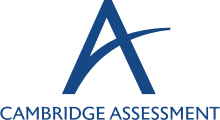University of Cambridge Local Examinations Syndicate
 University of Cambridge Local Examinations Syndicate Logo | |
| Abbreviation | UCLES |
|---|---|
| Formation | 1858 |
| Subsidiaries |
Cambridge International Examinations Cambridge English Language Assessment OCR |
| Website | www.cambridgeassessment.org.uk |
University of Cambridge Local Examinations Syndicate (UCLES) is a non-teaching department of the University of Cambridge and is a not-for-profit organisation. Cambridge Assessment is the brand name of UCLES.
Organization
Cambridge Assessment is Europe's largest assessment agency and is responsible for setting and marking a large number of examinations, both in the United Kingdom and internationally. Cambridge Assessment is not responsible for internal examinations at the University of Cambridge.
It is one of the largest international assessment agencies recognised by governments around the world. It has units that focus on research (including the Cambridge Psychometrics Centre until its move to the University of Cambridge), expanding e-assessment capabilities and delivering university admissions tests as well as three examining bodies:
- OCR is one of the three UK-wide awarding bodies. OCR offers GCSEs, A levels and a wide range of vocational qualifications to learners of all ages through 13,000 schools, colleges and other institutions within the United Kingdom;
- Cambridge International Examinations (CIE) (formerly known as University of Cambridge International Examinations) that provides assessment services to many governments and supplies International GCSEs, A and AS levels and business qualifications within the United Kingdom and worldwide;
- Cambridge English Language Assessment (formerly known as University of Cambridge ESOL Examinations) operates in 135 countries worldwide. Each year over 4 million people take a Cambridge English qualification;
It provides a programme of development in assessment and related issues. Every year over 30,000 people work with Cambridge Assessment by either attending conferences or by taking part in topical debates from their desk top.
History
UCLES was established in 1858 to administer examinations for persons who were not members of the University of Cambridge and to inspect schools, with the aim of raising standards in education. The Syndicate soon began examining in territories overseas and this aspect of its work grew quickly. At the beginning of the 20th century, the Syndicate was empowered to hold examinations for commercial certificates. The Certificate of Proficiency in English (known as the CPE), the Syndicate's first examination in the field of English as a foreign language, was introduced by UCLES to deliver proof of language proficiency to native speakers of languages other than English. Over the years, UCLES adopted further English language examinations, the First Certificate in English (FCE) and the Certificate in Advanced English (CAE). On the CEFR (Common European Framework of Reference for Languages) ranging from A1/A2 (lower level), B1/B2 (intermediate level) to C1/C2 (advanced level), the FCE is set at B2, the CAE at C1 and the CPE at C2.
In 1873, the universities of Oxford and Cambridge created the Oxford and Cambridge Schools Examination Board which became part of UCLES. The UCLES Group absorbed several other examination boards, including the Southern Universities Joint Board, the Midland Examining Group and the RSA Examinations and Assessment Foundation.
Cambridge Assessment celebrated its 150th anniversary in 2008.
Asian operations
On 9 November 2012, Cambridge Assessment Singapore was officially launched. Cambridge Assessment has been a trusted education partner in Asia Pacific for over 130 years—as a not-for-profit organisation and part of the University of Cambridge. Cambridge Assessment works with over 2000 schools in Asia Pacific who offer its international qualifications. Cambridge Assessment Singapore also works in partnership with governments in the region on assessment, and carry out leading-edge and operational research on assessment in education.
The Asia Pacific hub for Cambridge Assessment was set up as a charitable educational organisation. Together with Cambridge International Examinations, Cambridge Assessment Singapore will contribute to the development of effective teaching and successful learning in the Asia Pacific region by providing high-quality educational experiences and services for schools, policy-makers and assessment professionals.
The Asia Pacific office strategically located in Singapore, represents the perfect base for Cambridge to be part of the vibrant growth of countries in the region and to share its own experience.